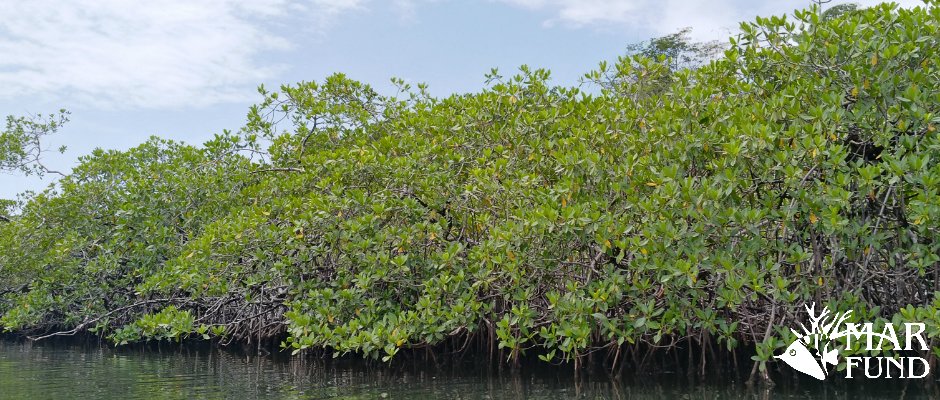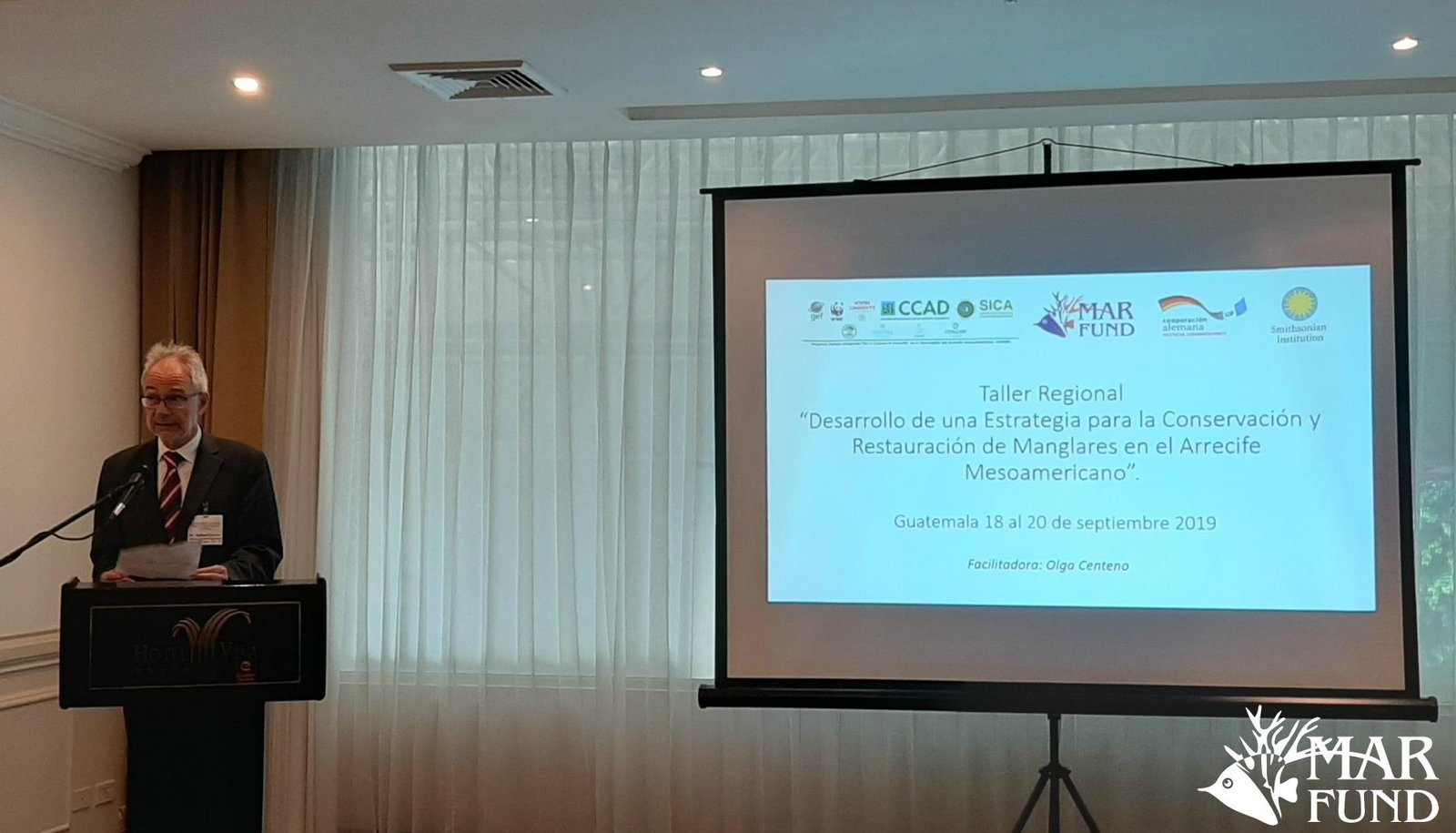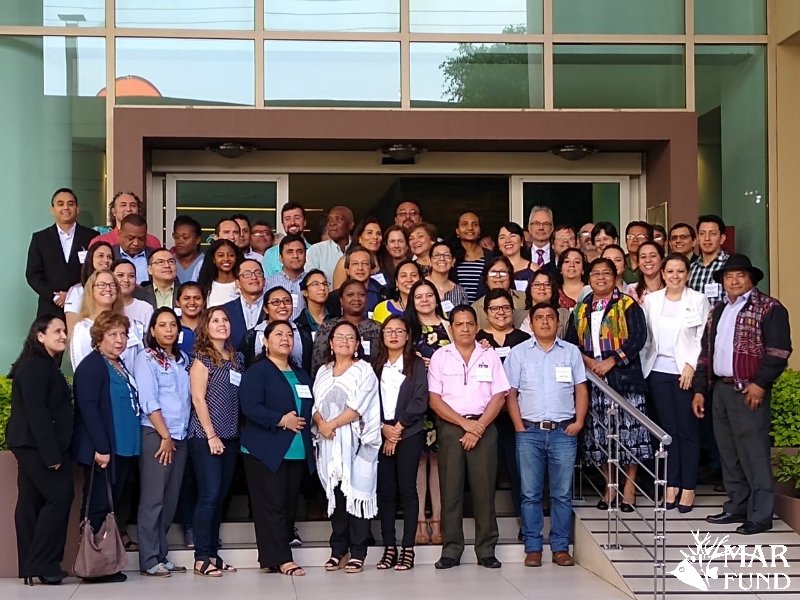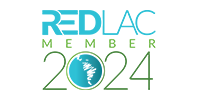A Regional Sustainable Management Strategy for Mangroves in the Mesoamerican Reef

Dwarf mangrove forests in the Guatemalan Caribbean region.
Text and photographs: Lucy Calderón
Specialized lectures, group activities, friendly discussions, and participative group meetings enlivened the workshop “Developing a Regional Strategy for Mangrove Conservation and Restoration in the Mesoamerican Reef”, held in Guatemala City on 18-20 September, 2019.
“After two days of intense work, we now have some of the parts that will shape the strategy we need,” stated Steven Canty enthusiastically. He is the coordinator of the Smithsonian Institution’s Marine Coastal Program and one of the workshop organizers.

Steven Canty, Smithsonian Institution.
Canty and representatives of the Mesoamerican Reef Fund (MAR Fund), with financial support from the German Embassy in Guatemala and the “Integrated Ridge-to-Reef Management of the Mesoamerican Reef” Project (MAR2R/CCAD/WWF), brought about this workshop to design the above-mentioned strategy.
Why is a regional strategy required?
The countries in the MAR region, in varying degrees, have implemented actions to conserve their mangrove ecosystems, enacting legislation and regulations, strengthening their government agencies and declaring protected areas. However, their efforts notwithstanding, mangrove cover is still being destroyed.
For example, Quintana Roo lost 5.5% of its mangrove cover since this state was created in 1974 (CONABIO, 2016); Belize lost 2% between 1980 and 2010 (Cherrington et al. 2010), and Honduras lost almost 12% from 1985 to 2013 (Chi-Farn Chen, 2013).
María José González, MAR Fund’s Executive Director, in her speech to welcome over 70 participants to the workshop, stated that it is important to undertake work with a regional approach because mangrove degradation affects the ecosystem continuum along the four countries and reduces its wealth and productive capacity.

María José González, MAR Fund’s Executive Director, –standing at the right– during the group work undertaken in the workshop.
“As a regional environmental fund with a mission to promote regional funding and alliances to further MAR conservation, restoration and sustainable use, we have supported initiatives pertaining to mangroves, such as analyzing their cover, assessing their economic and cultural value, and determining the climate change mitigation they provide by protecting blue carbon sinks. The results of these efforts have allowed us to understand that there is no comprehensive plan to conserve and rehabilitate this ecosystem. Thus, it is essential to work on an instrument with a regional vision that will organize the available information, define common objectives, propose conservation and rehabilitation strategies and measure progress achieved,” she stated.
Dr. Michael Grewe, Head of Cooperation at the German Embassy, remarked that the German government, by means of its Ministry of Foreign Affairs, provided funds to hold the workshop, seeking to contribute to understanding the present state of the ecosystem and to developing the basis for the unified regional strategy that is so direly needed.

Dr. Michael Grewe, Head of Cooperation at the German Embassy in Guatemala.
Dr. Grewe also stated that 70 percent of the funds provided by the German Cooperation in Latin America are aimed at environmental issues, as they consider that the region has considerable natural wealth that constitutes a source of life for humanity, while at the same time it is essential to safeguard the ecosystems. He reminded participants that at the G7 summit held in 2015, when Germany served as Chair, the plan for action, protection, and sustainable use of seas was approved, as one of the goals of the United Nations 2030 agenda.
Connectivity is undeniable
“There are ecosystemic links throughout the region and this showcases the need and urgency of working together, as there is no use in only one country working if other countries do not follow suit. To address problems in the MAR, we must all work together,” said Marco Vinicio Cerezo, member of MAR Fund’s Board of Directors and General Director of FUNDAECO.
Cerezo further added, “The threats to the MAR and the populations living in the area are many. Within the context of climate change, the region is highly vulnerable, so that countries, governments, citizens, and the private sector must join forces to protect the resources still remaining and must think about how we are going to adapt.”

Carlos Rodríguez –in the orange sweater–, from MAR Fund/MAR2R, conducting one of the group activities carried out during the workshop.
At the national level, the government priorities, within the framework of the Sustainable Development Goals and the intended nationally determined contributions (INDCs) include restoring ecosystems and adapting to climate change. “It is essential to address ecological connectivity, increased community participation, and management of coastal zones in order to expedite implementation of actions with a ‘ridge to reef’ approach,” said Luis Castellanos from the MAR2/CCAD-SIC Project during his presentation.
Participants in the workshop –from Mexico, Guatemala, Belize, and Honduras– are key actors in the efforts to protect mangroves: protected-area managers, local and national authorities, representatives of the academic sector, and non-government organizations with experience in managing, restoring, and researching this valuable ecosystem.

Group photograph of workshop participants.
Canty stated that “from now on, the main challenge for all participants is to stay in communication to assess and provide feedback on proposed actions and to keep the goal to jointly conserve and restore mangroves in the MAR region alive.”
Tags: Dwarf mangrove forests, Fundaeco, Integrated Ridge-to-Reef Management of the Mesoamerican Reef, intended nationally determined contributions (INDCs), MAR2/CCAD-SIC, MAR2R/CCAD/WWF, Regional Sustainable Management Strategy for Mangroves, Smithsonian Institution’s Marine Coastal Program



